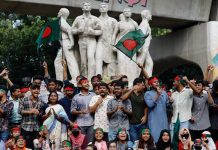DM Monitoring
ANKARA: Turkey has contributed to the cessation of the 30-year occupation of the Nagorno-Karabakh region, Turkish President Recep Tayyip Erdogan said.
President Erdogan made these remarks while delivering a speech in the parliament on Wednesday.
“Turkey has faced extremely difficult problems in the region, from the Eastern Mediterranean to Libya, from Syria to the Nagorno-Karabakh region,” the Turkish president added.
“But we will continue to fight and suppress terrorism,” the president said. “Turkey is the only country in NATO that fights terrorists face to face. Turkey saved democracy in Libya by supporting the legitimate government.”
“We created the conditions for the Federal Republic of Somalia to achieve stability,” President Erdogan said. “Turkey has contributed to the cessation of the 30-year regime of occupation and plunder in the Nagorno-Karabakh region, to which many countries turned a blind eye.”
Meanwhile on Wednesday, Iranian President Hassan Rouhani in a government meeting said the liberation of Azerbaijani territories was very effective in Iran’s economic actions.
The president noted that the Karabakh war resulted in the liberation of Azerbaijan’s border with Iran from occupiers.
Rouhani added that the first positive effect of the liberation of Azerbaijani territories was the final agreement between Iran and Azerbaijan on the Khudafarin hydro junction.
“Soon the electricity and water of this hydro junction will be used easily. This hydro junction can supply water to 120,000 hectares of Iran,” he said.
Azerbaijan’s historic win against Armenian separatists in Nagorno-Karabakh last month was an important geopolitical coup for Erdogan who has cemented Turkey’s leading role as a powerbroker in the ex-Soviet Caucasus region.
Turkey backed Azerbaijan during the six weeks of fighting that erupted in late September and left more than 5,000 people dead. Ankara was widely accused of dispatching mercenaries from Syria to bolster Baku’s army, but repeatedly denied the charge.
Armenia, Azerbaijan and Russia had signed an agreement on November 10 to end military conflict over the disputed enclave of Nagorno-Karabakh.
Armenian Prime Minister Nikol Pashinyan called the deal “incredibly painful both for me and both for our people”.
It follows six weeks of fighting between Azerbaijan and ethnic Armenians.
The region is internationally recognized as Azerbaijani but has been run by ethnic Armenians since 1994.
A Russian-brokered truce was signed at the end of the war in the early 1990s but there was no peace deal.
Although both sides took steps to reduce tensions last year, fighting erupted at the end of September and several attempts to end the conflict failed.
The new ceasefire agreement prompted anger in Armenia, as protesters stormed the parliament, beating up the speaker and reportedly looting the prime minister’s office.



